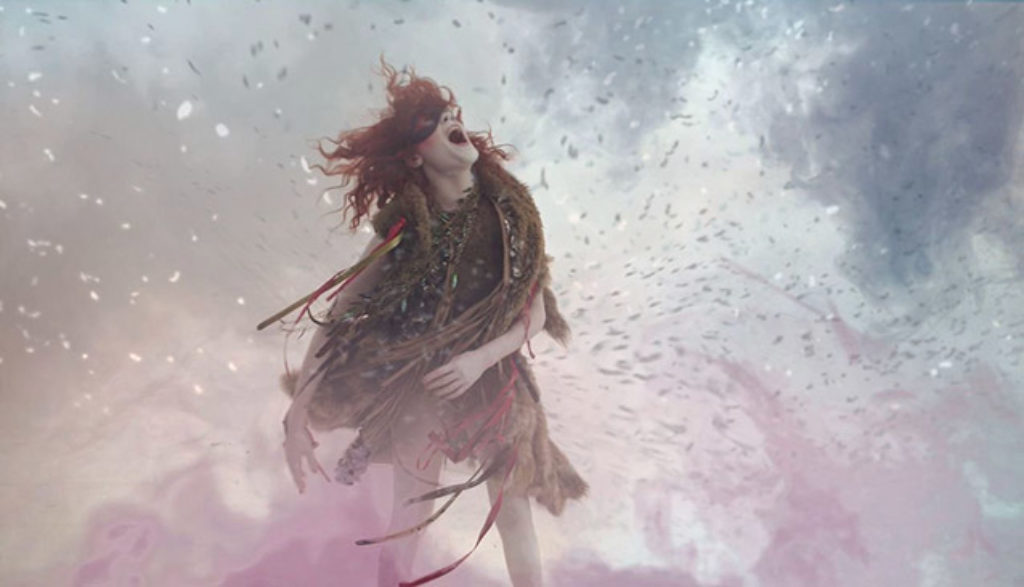
I have this (apparently) annoying habit of looking for meaning in things. In life. In culture. All around me, actually. It’s an irrepressible urge of mine. Especially when it comes to music, I go in with the assumption that musicians intend to communicate something. Maybe cryptically. Maybe via convoluted art. But I’m always convinced that there’s meaning to be unearthed if I’m willing to work hard enough.
Every so often, though, I come up with … nothing.
“Dog Days Are Over” is the first charting single in the U.S. from the British outfit Florence + the Machine, an indie group fronted by the fiery-haired and fiery-voiced Florence Welch. At first I thought the song was a reflection on how getting what we think we want sometimes ends up almost killing us. “Happiness hit her like a train on the track,” Florence begins quietly, as dreamy, chimey guitar notes sound in the distance. And our heroine perhaps decides that maybe happiness isn’t what she might have wanted after all: “She hid around corners/And she hid under beds/She killed it with kisses and from it she fled.”
But then, from there, what we seem to encounter is the tale of a fugitive from love: “Leave all your love and your longing behind/You can’t carry it with you if you want to survive/The dog days are over/The dog days are done.”
But we also get a repeated refrain about returning to one’s family—if, of course, you’re interpreting things literally. “Run fast for your mother, run fast for your father,” Florence sings. “Run for your children, all your sisters and brothers.” And I haven’t yet mentioned the paradoxical statements about wanting nothing—and everything—from some past relationship (“I never wanted anything from you/Except everything you had/And what was left after that too”).
So … maybe “Dog Days Are Over” is about a woman who’s afraid of love. Or happiness. Or someone who just couldn’t have what she wanted. Maybe all of that. Or none of it. And the video—Florence singing and writhing in white, geisha-like makeup and gauzy outfits while blue-skinned backup singers clap and a pseudo gospel choir croons—hardly clears anything up on the meaning front.
My insistence on a particular meaning in music must just be some kind of clingy holdover from my modernist upbringing. Because in our increasingly postmodern world, insisting on just one meaning is—if we listen to Florence herself talk about this song—unnecessarily limiting. In an interview earlier this year, Rick Florina of artistdirect.com asked her, “Would you say the creative palette you’re using is decidedly boundless?” Florence enthusiastically answered, “Absolutely everything and anything goes! … Random phrases hold so much weight. If you string them together, you can create a picture and this emotion you never even knew they initially had. Even though they have no correlation to each other, you string them together in a song and it creates this beautiful poetry and this whole new meaning. People can attach their own emotions to it. It’s like a riddle, but it’s for yourself.”
That doesn’t mean I’m going to stop searching for meaning. But it does mean I shouldn’t feel bad about not being able to figure it out this time.
A postscript: Like so many up-and-coming bands these days, Florence + the Machine has benefited from some high-profile entertainment tie-ins. Specifically, placing songs on the soundtracks to The Twilight Saga: Eclipse and Eat Pray Love. Perhaps even more significantly, the cast of Fox’s Glee recently covered “Dog Days Are Over.” The show has no doubt helped this relatively obscure (in America, anyway) band’s first big hit to scale the Billboard Hot 100. The Glee cast’s version is right behind it, too—further evidence of the music-oriented performance show’s impressive ability to turn almost everything it touches into pop-culture gold.

After serving as an associate editor at NavPress’ Discipleship Journal and consulting editor for Current Thoughts and Trends, Adam now oversees the editing and publishing of Plugged In’s reviews as the site’s director. He and his wife, Jennifer, have three children. In their free time, the Holzes enjoy playing games, a variety of musical instruments, swimming and … watching movies.